英语短语、句型常用搭配词典2
- 格式:pdf
- 大小:667.14 KB
- 文档页数:124
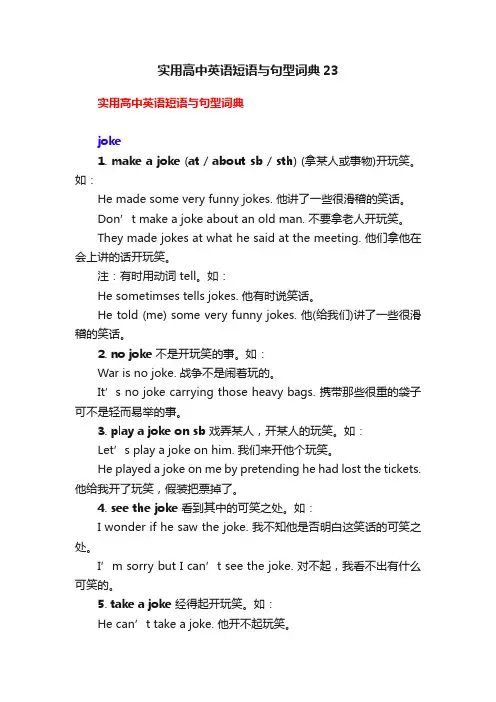
实用高中英语短语与句型词典23实用高中英语短语与句型词典joke1. make a joke (at / about sb / sth) (拿某人或事物)开玩笑。
如:He made some very funny jokes. 他讲了一些很滑稽的笑话。
Don’t make a joke about an old man. 不要拿老人开玩笑。
They made jokes at what he said at the meeting. 他们拿他在会上讲的话开玩笑。
注:有时用动词 tell。
如:He sometimses tells jokes. 他有时说笑话。
He told (me) some very funny jokes. 他(给我们)讲了一些很滑稽的笑话。
2. no joke不是开玩笑的事。
如:War is no joke. 战争不是闹着玩的。
It’s no joke carrying those heavy bags. 携带那些很重的袋子可不是轻而易举的事。
3. play a joke on sb戏弄某人,开某人的玩笑。
如:Let’s play a joke on him. 我们来开他个玩笑。
He played a joke on me by pretending he had lost the tickets. 他给我开了玩笑,假装把票掉了。
4. see the joke看到其中的可笑之处。
如:I wonder if he saw the joke. 我不知他是否明白这笑话的可笑之处。
I’m sorry but I can’t see the joke. 对不起,我看不出有什么可笑的。
5. take a joke经得起开玩笑。
如:He can’t take a joke. 他开不起玩笑。
6. joke (with sb) (about sth) (与某人)(就某事)开玩笑。
如:I’m serious, Jim. Don’t joke about it. 我是当真的,吉姆。
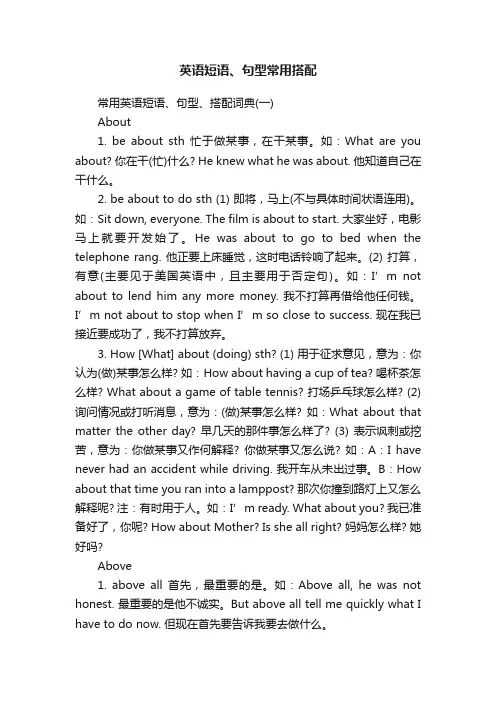
英语短语、句型常用搭配常用英语短语、句型、搭配词典(一)About1. be about sth 忙于做某事,在干某事。
如:What are you about? 你在干(忙)什么? He knew what he was about. 他知道自己在干什么。
2. be about to do sth (1) 即将,马上(不与具体时间状语连用)。
如:Sit down, everyone. The film is about to start. 大家坐好,电影马上就要开发始了。
He was about to go to bed when the telephone rang. 他正要上床睡觉,这时电话铃响了起来。
(2) 打算,有意(主要见于美国英语中,且主要用于否定句)。
如:I’m not about to lend him any more money. 我不打算再借给他任何钱。
I’m not about to stop when I’m so clo se to success. 现在我已接近要成功了,我不打算放弃。
3. How [What] about (doing) sth? (1) 用于征求意见,意为:你认为(做)某事怎么样? 如:How about having a cup of tea? 喝杯茶怎么样? What about a game of table tennis? 打场乒乓球怎么样? (2) 询问情况或打听消息,意为:(做)某事怎么样? 如:What about that matter the other day? 早几天的那件事怎么样了? (3) 表示讽刺或挖苦,意为:你做某事又作何解释? 你做某事又怎么说? 如:A:I have never had an accident while driving. 我开车从未出过事。
B:How about that time you ran into a lamppost? 那次你撞到路灯上又怎么解释呢? 注:有时用于人。
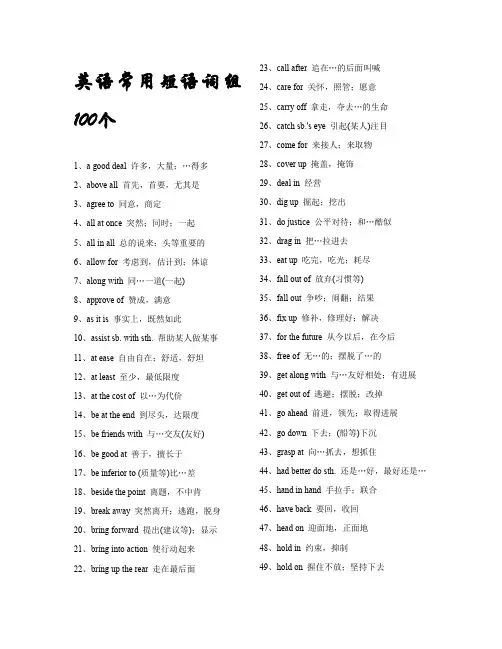
英语常用短语词组100个1、a good deal 许多,大量;…得多2、above all 首先,首要,尤其是3、agree to 同意,商定4、all at once 突然;同时;一起5、all in all 总的说来;头等重要的6、allow for 考虑到,估计到;体谅7、along with 同…一道(一起)8、approve of 赞成,满意9、as it is 事实上,既然如此10、assist sb. with sth. 帮助某人做某事11、at ease 自由自在;舒适,舒坦12、at least 至少,最低限度13、at the cost of 以…为代价14、be at the end 到尽头,达限度15、be friends with 与…交友(友好)16、be good at 善于,擅长于17、be inferior to (质量等)比…差18、beside the point 离题,不中肯19、break away 突然离开;逃跑,脱身20、bring forward 提出(建议等);显示21、bring into action 使行动起来22、bring up the rear 走在最后面23、call after 追在…的后面叫喊24、care for 关怀,照管;愿意25、carry off 拿走,夺去…的生命26、catch sb.'s eye 引起(某人)注目27、come for 来接人;来取物28、cover up 掩盖,掩饰29、deal in 经营30、dig up 掘起;挖出31、do justice 公平对待;和…酷似32、drag in 把…拉进去33、eat up 吃完,吃光;耗尽34、fall out of 放弃(习惯等)35、fall out 争吵;闹翻;结果36、fix up 修补,修理好;解决37、for the future 从今以后,在今后38、free of 无…的;摆脱了…的39、get along with 与…友好相处;有进展40、get out of 逃避;摆脱;改掉41、go ahead 前进,领先;取得进展42、go down 下去;(船等)下沉43、grasp at 向…抓去,想抓住44、had better do sth. 还是…好,最好还是…45、hand in hand 手拉手;联合46、have back 要回,收回47、head on 迎面地,正面地48、hold in 约束,抑制49、hold on 握住不放;坚持下去50、hold...against 记恨51、hurry up (使)赶快;迅速完成52、in addition to 除…之外(还有)53、in comparison with 与…比较54、in difficulties 处境困难55、in face of 面对;纵然,即使56、in focus 焦点对准;清晰57、in relation to 关于,有关;与…相比58、in season (水果等)应时的59、in so far as (程度等)就…;至于60、in the name of 以…的名义;代表61、inquire after 问起(某人)的健康情况62、judging by 从…判断63、keep early hours 早睡早起64、keep up 继续;坚持,维持65、knock off 把…敲掉;击倒;停工66、lead up to 把…一直带领到;导致67、let go 放开;释放;发射68、listen into 收听;监听;偷听69、live through 经历过;度过;经受住70、long since 很久以前;很久以来71、made up of 由…组成,由…构成72、make light of 轻视,藐视73、none other than 不是别人而正是74、not as...as... 不如…那样75、not in the least 毫不76、off duty 下班77、on one's own 独自地;主动地78、on principle 根据原则,按照原则79、once more 再一次,又一次80、out of control 失去控制81、out of danger 脱离危险82、out of doors 在户外83、out of practice 久不练习,荒疏84、pass on 把…传给别人;转入85、pick up 拣起;(车等)中途搭人86、put through 使穿过;使从事87、put...in force 实施…;使…生效88、rain out 因下雨阻碍89、rather too 稍微…一点90、react to 对…起反应91、roll in 滚滚而来;蜂拥而来92、roll up (烟雾)袅袅上升;卷起93、round and round (围绕着…)不息地旋转94、search after 探索;寻找95、seize hold of 抓住;占领96、take a hand in 参加;帮助97、take one's chance 碰运气,听任命运98、take pride in 以…自豪99、to the contrary 意思相反的(地)100、to the number of 合计数为…。
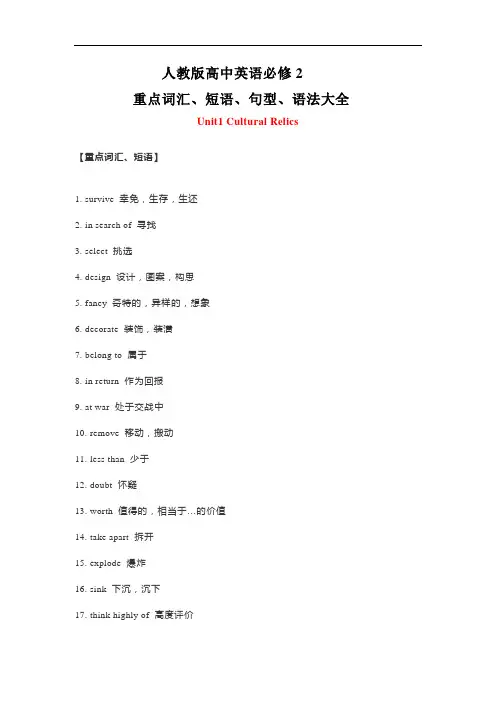
人教版高中英语必修2重点词汇、短语、句型、语法大全Unit1 Cultural Relics【重点词汇、短语】1. survive 幸免,生存,生还2. in search of 寻找3. select 挑选4. design 设计,图案,构思5. fancy 奇特的,异样的,想象6. decorate 装饰,装潢7. belong to 属于8. in return 作为回报9. at war 处于交战中10. remove 移动,搬动11. less than 少于12. doubt 怀疑13. worth 值得的,相当于…的价值14. take apart 拆开15. explode 爆炸16. sink 下沉,沉下17. think highly of 高度评价【重点句型】1. There is no doubt that… 毫无疑问…2. when的用法was/were doing…when… 正在做某事…这时was/were about to do… when…. 将要做某事…这时had just done…when…刚做完某事…这时3. China is larger than any other country in the world. (同一范围内的比较)She runs faster than any man in Greece. (不同范围内的比较)4. the way的用法The way___ he explained to us was quite simple. (that/which/省略)The way ___ he explained the sentence to us was not difficult. (that/in which/省略) 5. worth的用法be (well) worth doing sth (很)值得做某事be worthy to be done = be worthy of being doneIt’s worthwhile to do sth= it’s worthwhile doing sth6. “疑问词+ to do” 结构,在句中做主语、宾语、表语How to do it is a question.I do n’t know what to do next.7. it做形式主语It has been proved that pride goes before a fall.事实证明骄必败。
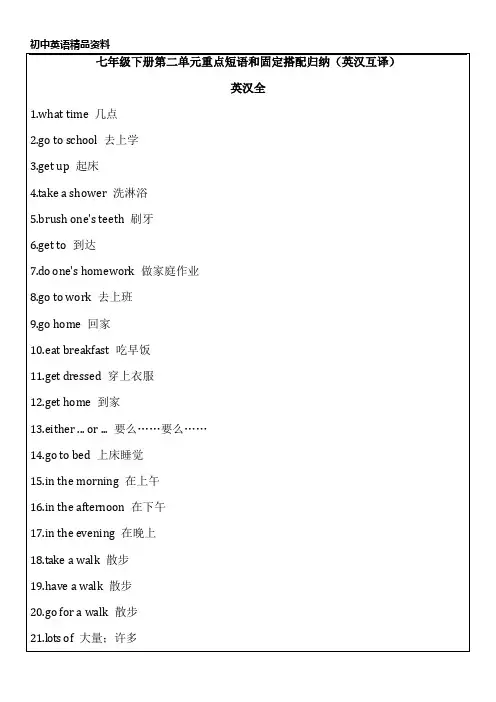
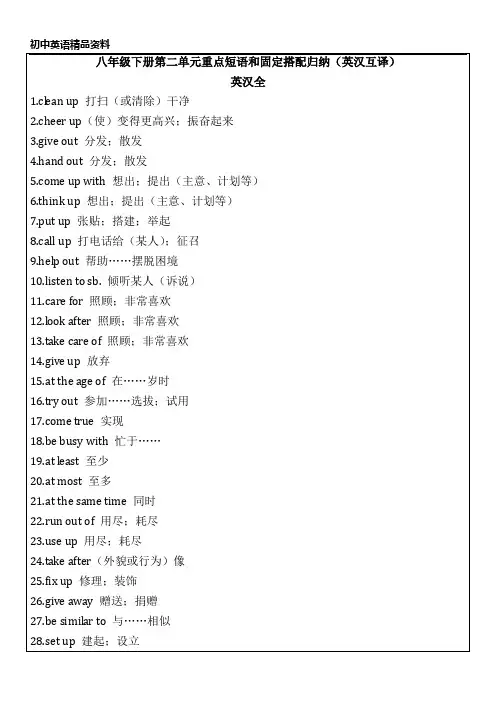
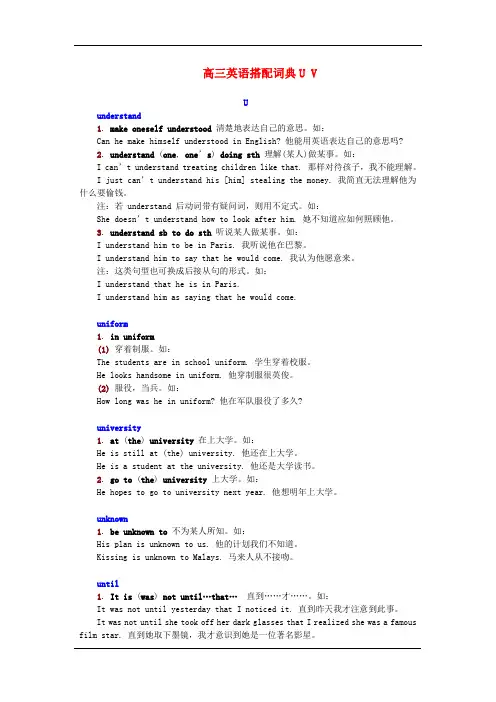
高三英语搭配词典U VUunderstand1. make oneself understood清楚地表达自己的意思。
如:Can he make himself understood in English? 他能用英语表达自己的意思吗?2. understand (one, one’s) doing sth理解(某人)做某事。
如:I can’t understand treating children like that. 那样对待孩子,我不能理解。
I just can’t unders tand his [him] stealing the money. 我简直无法理解他为什么要偷钱。
注:若 understand 后动词带有疑问词,则用不定式。
如:She doesn’t understand how to look after him. 她不知道应如何照顾他。
3. understand sb to do sth听说某人做某事。
如:I understand him to be in Paris. 我听说他在巴黎。
I understand him to say that he would come. 我认为他愿意来。
注:这类句型也可换成后接从句的形式。
如:I understand that he is in Paris.I understand him as saying that he would come.uniform1. in uniform(1) 穿着制服。
如:The students are in school uniform. 学生穿着校服。
He looks handsome in uniform. 他穿制服很英俊。
(2) 服役,当兵。
如:How long was he in uniform? 他在军队服役了多久?university1. at (the) university在上大学。
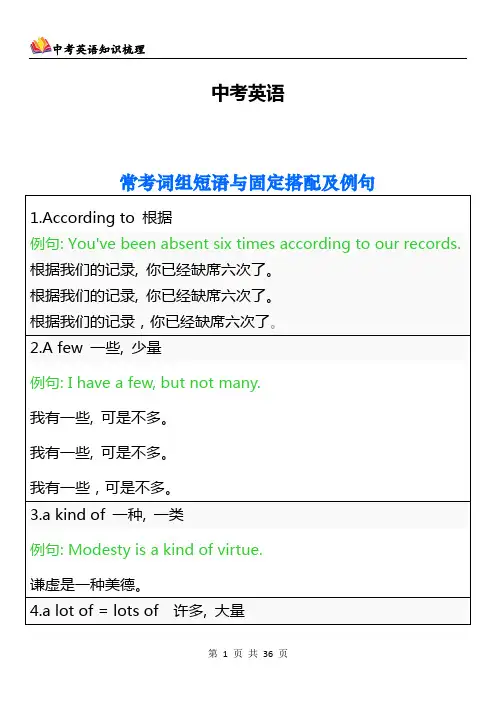
中考英语常考词组短语与固定搭配及例句1.According to 根据例句: You've been absent six times according to our records. 根据我们的记录, 你已经缺席六次了。
根据我们的记录, 你已经缺席六次了。
根据我们的记录,你已经缺席六次了。
2.A few 一些, 少量例句: I have a few, but not many.我有一些, 可是不多。
我有一些, 可是不多。
我有一些,可是不多。
3.a kind of 一种, 一类例句: Modesty is a kind of virtue.谦虚是一种美德。
4.a lot of = lots of 许多, 大量例句: I think a lot of people still underestimate him我觉得很多人仍然低估了他。
5.a pair of 一双, 一副a pair of scissors/shoes/trousers一把剪刀/一双鞋子/一条裤子例句: A pair of dancers are performing on the dance floor.一对舞伴正在舞池里表演。
6.a piece of 一块, 一张, 一片例句: picked up a piece of wood and started carving.我拿起一块木头, 开始雕刻起来。
我拿起一块木头, 开始雕刻起来。
我拿起一块木头,开始雕刻起来。
7.After class 课后例句: After class, I go to play basketball with my friends. 下课后, 我和我的朋友去打篮球。
下课后, 我和我的朋友去打篮球。
下课后,我和我的朋友去打篮球。
8.agree to do sth 同意做某事例句: I agree to do the job.我同意做这项工作9.agree with sb 同意某人的看法例句: No, I'm sorry, I can't agree with you不, 很抱歉, 我不同意你的看法。
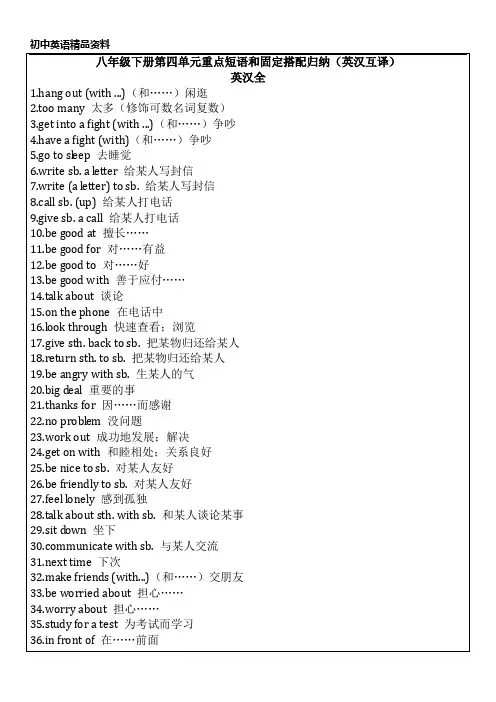
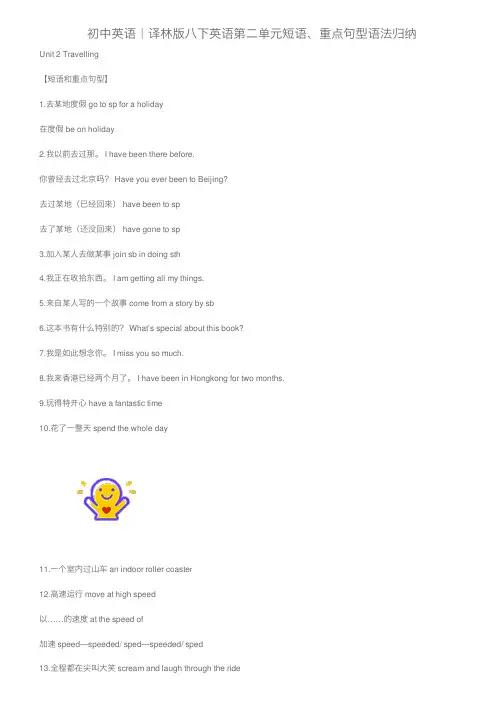
初中英语|译林版⼋下英语第⼆单元短语、重点句型语法归纳Unit 2 Travelling【短语和重点句型】1.去某地度假 go to sp for a holiday在度假 be on holiday2.我以前去过那。
I have been there before.你曾经去过北京吗? Have you ever been to Beijing?去过某地(已经回来) have been to sp去了某地(还没回来) have gone to sp3.加⼊某⼈去做某事 join sb in doing sth4.我正在收拾东西。
I am getting all my things.5.来⾃某⼈写的⼀个故事 come from a story by sb6.这本书有什么特别的? What’s special about this book?7.我是如此想念你。
I miss you so much.8.我来⾹港已经两个⽉了。
I have been in Hongkong for two months.9.玩得特开⼼ have a fantastic time10.花了⼀整天 spend the whole day11.⼀个室内过⼭车 an indoor roller coaster12.⾼速运⾏ move at high speed以……的速度 at the speed of加速 speed—speeded/ sped—speeded/ sped13.全程都在尖叫⼤笑 scream and laugh through the ride14.匆忙去餐馆吃了份快餐 hurry to a restaurant to have a quick meal14.匆忙去餐馆吃了份快餐 hurry to a restaurant to have a quick meal15.匆忙去某地 hurry to sp (动词)/ go to sp in a hurry(名词)匆忙做某事 hurry to do sth16.见到⼀些迪⼠尼卡通⼈物 meet some Disney cartoon characters17.⽐⽅说 such as18.迪⼠尼⼈物的游⾏ a parade of Disney characters19.跟在他们后⾯跑 run after them20.忍不住拍照 can’t stop taking photos忍不住做某事 can’t stop doing sth21.看了⼀场4D电影 watch a 4-D film22.就像是魔术 be like magic (名词)23.闻到苹果馅饼的味道 smell the apple pie24.给某⼈买了⼏个钥匙扣 buy a couple of key rings for sb25.这天快要结束的时候 at the end of the day26.看烟花 watch the fireworks27.在烟花下看上去闪亮⼜漂亮 look bright and beautiful under the fireworks28.在你待在那期间 during your stay there (名词)29.待在家 stay at home (动词)30.这个是送给你的。
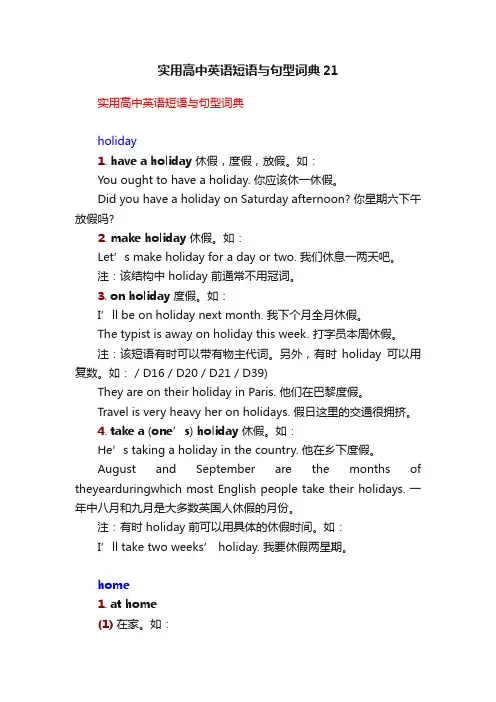
实用高中英语短语与句型词典21实用高中英语短语与句型词典holiday1. have a holiday休假,度假,放假。
如:You ought to have a holiday. 你应该休一休假。
Did you have a holiday on Saturday afternoon? 你星期六下午放假吗?2. make holiday休假。
如:Let’s make holiday for a day or two.我们休息一两天吧。
注:该结构中 holiday 前通常不用冠词。
3. on holiday度假。
如:I’ll be on holiday next month.我下个月全月休假。
The typist is away on holiday this week. 打字员本周休假。
注:该短语有时可以带有物主代词。
另外,有时holiday可以用复数。
如: / D16 / D20 / D21 / D39)They are on their holiday in Paris. 他们在巴黎度假。
Travel is very heavy her on holidays. 假日这里的交通很拥挤。
4. take a (one’s) holiday休假。
如:He’s taking a holiday in the country.他在乡下度假。
August and September are the months of theyearduringwhich most English people take their holidays. 一年中八月和九月是大多数英国人休假的月份。
注:有时 holiday 前可以用具体的休假时间。
如:I’ll take two weeks’ holiday.我要休假两星期。
home1. at home(1)在家。
如:Is your mother at home? 你母亲在家吗?I left my books at home. 我把书忘在家里了。
很高兴为您提供英文短语搭配词典。
以下是一些常用的英文短语及其搭配:1. Break the ice: 打破僵局- "He told a joke to break the ice at the meeting."2. Piece of cake: 小菜一碟- "The exam was a piece of cake for her."3. Hit the jackpot: 中大奖- "He hit the jackpot and won the lottery."4. A blessing in disguise: 因祸得福- "Losing that job was a blessing in disguise, as it pushed him to start his own business."5. Catch someone's eye: 引起某人注意- "Her colorful dress caught everyone's eye at the party."6. Get cold feet: 临阵退缩- "He got cold feet and decided not to go skydiving."7. In the nick of time: 及时- "The ambulance arrived in the nick of time to save his life."8. On cloud nine: 开心极了- "She was on cloud nine after receiving the promotion."9. A taste of your own medicine: 以牙还牙- "He finally experienced a taste of his own medicine when his lies were exposed."10. Keep an eye on: 密切关注- "Please keep an eye on my luggage while I use the restroom."这些是一些常见的英文短语及其搭配,希望对您有所帮助!。
实用高中英语短语与句型词典实用高中英语短语与句型词典neither1. neither…nor…既不……也不……。
如:It’s neither too cold nor too hot.天气既不太冷也不太热。
Mary neither likes maths nor (likes) history. 玛丽既不喜欢数学也不喜欢历史。
Neither boys nor girls are interested in it. 男孩子和女孩子对此都不感兴趣。
注:若连接两个句子,要用倒装。
如:Neither does he smoke nor does he drink. 他既不抽烟也不喝酒。
2. neither of……两者都不。
如:Neither of my parents knows English. 我父母都不懂英语。
I met neither of them in the park. 我在公园他们俩人都没见到。
注:neither of 后接名词时,名词前必须要有限定词。
如:这两部电影都没有趣。
正:Neither of the films is interesting.误:Neither of films is interesting.nervous1. be nervous about [of] 对……感到紧张或害怕。
如:We’re nervous about [of] our first trip abroad.我们对初次出国旅行感到很紧张。
He’s nervous about [of] staying alone a t night. 他害怕晚上一个人呆着。
next1. (the) next time下一次。
如:I’ll tell him about it (the) next time I see him.我下一次见到他时,我就把这个情况告诉他。
Come to see us next time you are in town. 下次进城来,到我们这里来玩。
实用高中英语短语与句型词典22实用高中英语短语与句型词典impress1. impress sb as…给某人的印象是……。
如:He impressed me as an honest man. 他给我的印象是很老实。
She impressed me as a woman of great kindness. 在我的印象中,她是一位非常仁慈的女性。
注:该句型中as后的情况指的通常是句子主语,而不是impress 后的宾语。
如:She impressed me as being very rude.正:在我的印象中,她很粗鲁。
误:她对我的印象是我很粗鲁。
2. impress sb with sth(1)某事给某人留下深刻印象。
如:He impressed me with his courage. 他的勇敢给我留下了很深的印象。
They impressed us with their performance. 他们的精彩表演给我们留下了很深的印象。
注:有时用 sb is impressed with [by, at] sth 这样的被动结构。
如以下各句也可说成:I was impressed with [by, at] his courage.We were impressed with [by, at] their performance.(2)使某人铭记某事物,向某人强调某事物。
如:I will impress you with one thing. 我向你强调一件事。
He impressed me with the importance of work. 他要我铭记工作的重要性。
注:该结构也可用 impress sth on sb / impress on sb sth表示。
如以上两句也可说成:I will impress one thing on you.He impressed the importance of work on me. / He impressed on me the importance of work.3. impress sth on [upon] sth把某物印在某物上。
初中英语固定搭配速查在学习英语的过程中,固定搭配是非常重要的部分。
掌握各种搭配可以帮助我们更流利地表达自己的意思。
下面就给大家总结了一些初中英语中常见的固定搭配,希望对大家的学习有所帮助。
1. Set off: 出发We should set off early if we want to avoid traffic.2. Break up: 分手They broke up last month, but now they are back together.3. Catch up: 赶上I need to catch up on my homework before the test.4. Bring up: 提出He brought up a very interesting point during the discussion.5. Look forward to: 期待I am looking forward to meeting you next week.6. Carry out: 执行We need to carry out the plan as soon as possible.7. Pick up: 捡起I picked up some trash on the beach yesterday.8. Put up with: 忍受I can’t put up with his bad behavior any longer.9. Run out of: 用光We ran out of milk, so I need to buy some more.10. Turn down: 拒绝He turned down the job offer because the salary was too low.11. Get along: 相处They get along really well with each other.12. Look up to: 尊敬I have always looked up to my parents.13. Give up: 放弃Don’t give up, you can do it if you try.14. Point out: 指出He pointed out the mistake in my essay.15. Run into: 偶遇I ran into an old friend at the supermarket.16. Bring about: 导致The new policy brought about a lot of changes in the company.17. Come across: 偶然遇到I came across an interesting book while browsing the library.18. Put off: 推迟The meeting has been put off until next week.19. Make up: 编造I had to make up an excuse for being late.20. Look after: 照顾She looks after her younger brother every day.掌握这些固定搭配,可以让我们的英语表达更加准确地表达我们的意思。
初中英语常用词组与固定搭配中考短语总结1. …as soon as… 一… 就…Mary一见到她弟弟就会告诉他这个消息。
Mary will tell her brother this message as soon as he sees him.我们一到那儿就去爬山了。
We went climbing as soon as we arrived / got / reached there.2. as + adj./adv.+ as… …和…一样(的/ 地)…not as(so)…as… …不如/ 不比… ….李雷和吉母跑得一样快。
Li Lei runs as fast as Jim.约翰和你的年龄不一样大。
John is not as (so) old as you.这部电视剧不如那部有趣。
(TV series)This TV series is not as (so) interesting as that one.3. as +adj./adv.+ as possible 尽可能… 的/ 地…我们在英语课上应该尽可能地多讲英语。
We should speak English as much as possible in English class.你能不能尽可能慢一些读这个句子?Can you read the sentence as slowly as possible?4. ask sb for sth 向某人要求某物当你迷路时,你可以向警察需求帮助。
When you get lost, you can ask the police for help.一些学生经常向父母要钱去玩电子游戏。
(video games)Some students often ask their parents for money to play video games.他向父母要一辆自行车作为生日礼物。
He asked his parents for a bicycle as his birthday present.5. ask/ tell sb. (how) to do sth 询问/ 告诉某人如何做某事许多学生经常问老师如何才能学好英语。
实用高中英语短语与句型词典34实用高中英语短语与句型词典put1. put away(1)收拾。
如:Put your books away. 把书收起来。
(2)放弃,打消。
如:I asked him to put away such foolish ideas. 我叫他放弃这种愚蠢的想法。
(3)存蓄。
如:It is wise to have some money put away for old age. 存一些钱到年老时用是明智之举。
2. put down(1)放下,写下,记下,使下车。
如:He put down his book and stood up. 他放下书站了起来。
Put me down at the next stop. 让我在下一站下车。
Let me put down your telephone number. 让我记下你的电话号码。
Everything he said was put down at once. 他说的话马上被记下来。
(4)镇压,击败,贬低。
如:No one could put down the movement. 没有人能把这次运动镇压下去。
She really put him down when she called him lazy. 当她说他懒惰时,她确实把他贬低了。
3. put off(1)推迟,延期。
如:We decided to put off our holiday to [till, until] next month.我们决定把假期推迟到下个月。
Never put off till tomorrow what may be done today. 今日事,今日毕。
注:后接动词时,要用动名词。
如:We decided to put off leaving. 我们决定推迟动身。
(2)推脱,搪塞。
如:I put him off with a promise to pay him next week. 我搪塞他一下,答应下周还他钱。
常用英语短语、句型与搭配词典(二)finish1. finish (doing) sth做完某事。
如:Have you finished (reading) the book? 这本书你读完了吗?There was a deadly silence after she finished speaking. 她说完话后是一片沉默。
2. finish off [up](1) 吃完,吃光。
如:Let’s finish off the wine. 我们把酒喝了。
The cat will finish up the fish. 猫会把鱼吃完的。
(2) 做完,结束。
如:We finish up in Paris. 我们在巴黎结束行程。
She finished off her speech by thanking her sponsors. 她结束演讲前,感谢了赞助她的人。
3. finish with sth (sb)(1) 完成或结束后不再用某人或某物。
如:Have you finished with the newspaper? 报纸你看完了吗?Can you wait for a moment? I’ve not finished with Mary. 请稍等一下,我和玛丽还没有完事呢。
注:有时用于以下这样的系表结构:Are you finished with the scissors? 剪刀你用完了吗?(2) 与某人绝交或断绝联系。
如:He should finish with such friends. 他应该与那些朋友绝交。
I’ve finished with smoking. 我已戒烟了。
fire1. catch [take] fire着火,开始燃烧。
如:Cotton catches fire easily. 棉花容易着火。
The house took [caught] fire. 房子着火了。
2. make [start, build] a fire生火。
如:Let’s start [make, build] a fire. 我们生个火吧。
You put up the tent and I’ll start the fire. 你搭帐篷,我来生火。
注:start a fire 有时表示“引起火灾”。
如:A cigarette thrown into the woods in dry weather may start a fire. 干燥时将点燃的香烟扔在树林里会引起火灾。
2. on fire着火。
如:The house is on fire. 房子着火了。
Her clothes were on fire. 她的衣服着火了。
3. set fire to sth / set sth on fire使燃烧,放火烧。
如:He set fire to the house. / He set the house on fire. 他放火烧了房子。
first1. be the first to do sth是做某事的第一个。
如:He was the first (man) to come. 他是第一到的。
Whoever is the first to finish will get a prize. 头一个做完的人得奖。
2. I t’s the first time+that-clause第一次做某事。
如:It’s the first time I’ve come here. 这是我第一次来这儿。
It’s the first time that he has seen an elephant. 这是他第一次见到大象。
注:该句型的从句谓通常用现在完成时态。
3. the first time第一次(用作连词)。
如:He fell in love with her the first time he saw her. 他对她一见钟情。
The first time I flew in a plane I was really nervous. 我第一次坐飞机时真的很紧张。
比较:When I flew in a plane for the first time, I was really nervous.4. at first开始,起初。
如:I found English very difficult at first. 我开始发现英语很难。
At first I didn’t like him but now I do. 起初我不喜欢他,但现在喜欢了。
比较 first 与 at first:前者强调先生顺序,后者强调前后对照。
比较:I’ll have to finish my homework first. 我得先把作业做完。
At first I didn’t want to go, but I soon changed my mind. 我开始不想去,但我很快就改变了主意。
憖拝櫪洀fit1. be fit for [to do] sth适合做(做)某事。
如:The water is not fit to drink. 这水不适合饮用。
He’s not fit for [to do] the work. 他不适合做这项工作。
注:后接不定式时,若主语与不定式有动宾关系,不定式可用主动式,也可用被动式。
如:They are not fit to eat [to be eaten]. 它们不适合食用。
2. fit sb (sth) for sth使某人(某物)能适合于……。
如:The course fits you for the position. 学习这门课程能使你胜任这个职位。
3. fit sth to sth使某事物与某事物相符合。
如:Let me fit my plan to yours. 让我的计划来配合你的计划。
We always fit our deeds to our words. 我们向来说话算数。
fix1. fix on sb (sth) 选定或确定某人(某事物)。
如:We fixed on Bill as the new chairman. 我们决定让比尔当新的主席。
Have you fixed on the date for the meeting? 你们确定了开会的时间吗?注:有时可后接动名词。
如:We have fixed on starting tomorrow. 我们决定明天出发。
2. fix to do sth决定做某事。
如:He is fixing to study abroad. 他决定出国留学。
We have fixed to return home. 我们决定返回家。
注:有时不定式前或带有疑问词。
如:We haven’t fixed where to stay. 我们还没决定住什么地方。
Have you fixed who (is) to lead? 你们决定了谁做领导吗?3. fix sb up with sth为某人安排或提供某事或某物。
如:I’ll fix you up with a place to stay. 我来给你安排住处。
Can you fix me up with a job? 你能为我安排一个工作吗?4. fix sth on [upon] sth把某物集中于某物。
如:He fixed his eyes on the picture on the wall. 他的眼睛盯着墙上的画。
He fixed his thoughts [attention] on his work. 他全神贯注地工作。
5. fix up决定,安排。
如:Let’s fix up a time for the party. 我们给聚会订个时间吧。
We haven’t fixed up the date of her visit yet. 她访问的日期我们还没有作出决定。
注:该用法中的副词 up 常可省略。
flood1. a flood of大量的。
如:What a flood of rain! 好大的雨啊!A flood of letters came. 收到了大量的信件。
2. in flood (洪水)泛滥。
如:The river is in flood. 河水泛滥。
follow1. as follows如下。
如:The rules are as follows. 规则如下。
His explanation is as follows. 他的解释如下。
2. be followed by跟在……之后。
如:In English the letter Q is always followed by a U. 英语中的字母 Q 后总要跟一个字母U。
The lightning was quickly followed by heavy thunder. 闪电过后紧接着是响雷。
3. follow one’s example仿效某人的做法。
如:He followed his sister’s example and went to college. 他效仿他的姐姐也进了大学。
I don’t want you to follow my example and rush into marriage. 我希望你不要效法我,也仓促结婚。
fond1. be fond of sb (sth) 喜欢某人(某事物)。
如:He is very fond of Chinses food. 他很喜欢吃中国菜。
Tell me whether he is fond of you. 告诉我他是否喜欢你。
2. be fond of doing sth喜欢做某事。
如:He is very fond of playing the piano. 他很喜欢弹钢琴。
She is fond of going to the cinema. 她喜欢看电影。
fool1. be fool enough to do sth (某人)做某事真是很蠢。
如:He was fool enough to believe her. 他真笨,竟然去相信她的话。
2. make a fool of sb欺骗或愚弄某人。
如:Don’t make a fool of the old lady. 不要捉弄这位老太婆。
We were all made fools of by the door-to-door salesman. 我们全给上门的推销员哄骗了。
3. make a fool of oneself出洋相,出丑。